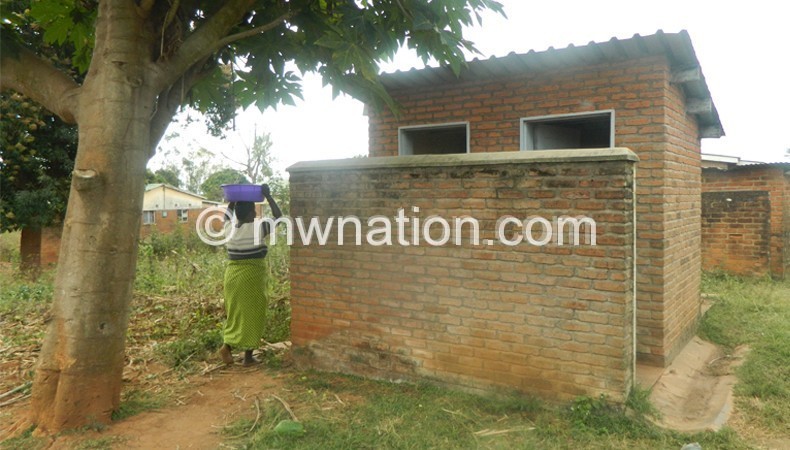Baths in toilets at Khonjeni
In Khonjeni, precisely Khonjeni Health Centre, about 26 kilometres from Thyolo Boma, adding a year has hardly signalled progress in quality of public services at the health centre. For over a decade, sleeping on the floor and taking baths in toilets has been a tradition for women seeking maternal health services at the facility.
In the just ended year, The Nation visited the health centre twice and appreciated the same old story of paucity and pitiable services. For those who visited the centre 10 years ago, they will be shocked to see the depreciation of the quality of structure and services offered.

Made up of two blocks, the facility wears the same aged chronicle of deficiency, substandard, high patient -to-nurse-ratios, archaic facilities, increased burden and under-staffing. The structure too is on its way to out-of-shape.
While pointing at the rotten and broken timber that makes part of the roofing of the main structure the health centre in-charge Moses Chandamale, disclosed that he is helpless.
“We have submitted several reports to the authorities, but nothing is being done,” said Chandamale, while revealing that there is no running water.
The submitted reports may not be telling the story as it is. As you look at the heavily pregnant mothers balancing a bucket of water on their heads as they head towards the only two pit latrine toilet blocks away from the hospital structures, you may think they are going to a proper bathroom. But for over two years now, there are no bathrooms and of the eight toilets, only two are usable. These are used for both bathing and toilet.
“We usually place the bucket to cover the latrine hole, but stench still comes out,” lamented one woman, Mumderanji Musowa.
She revealed that most pregnant women are forced to take bath at night. There is no electricity, but one woman complained that some people watch women when taking a bath at night, especially when there is moonlight. She said this forces them to endure the toilet stench.
In an earlier interview, health and education rights programme executive director Maziko Matemba, described the situation at the facility as unacceptable.
Sad tales of maternal health challenges are pasted in the maternal ward where only three nurses administer, on average, 25 deliveries per week, according to records at the facility. In a day, 15 to 20 women seek maternal services.
The facility has 10 beds in maternity ward, but only five have mattresses. During the visit, we found seven women who had just delivered relaxing on five beds with mattresses. Four heavily pregnant women were sleeping on the floor alongside some guardians.
Since 2000, as aligned in the just phased out Millennium Development Goals (MDGs), Malawi has been on a journey towards improved maternal health service and reduced mortality rate, but like a decade ago, Khonjeni Health Centre continues to register high maternal and neonatal mortality rate.
Between January and June 2015, 10 lives were lost to pregnancy complications. The figure is reported to have doubled by the end of the year. Former health minister, Jean Kalilani, in July revealed at a Health Sector Wide Approach(Hswap) meeting that 328 mothers die every six months to birth complications. Government statistics shows that maternal mortality stands at 510 per 100 000 live births.
Sadly, some maternal deaths that Khonjeni Health Centre could avoid by seeking additional service at referral hospitals such as Thyolo District Hospital continue to occur due to lack of ambulances.
For one to be taken to the district hospital you have to meet the cost of travel pegged at K10 000, according to Chandamale.
While Khonjeni’s story is exceptional and calls for immediate action, the hand that will rescue the facility will have to reach out to other health centres across Malawi. Apart from improving the facility and services, Chandamale suggests the need for another health facility in the area to reduce the distance for some women seeking maternal services.
Women from Makapwa and part of Sandama walk about 15 kilometres to the facility. The story is the same for pregnant women from Ndunde, Ndala and Manyamba in Mulanje who rely on Muloza Health Centre.
In all these areas, those that cannot walk have to pay for Matola or pay between K500 and K1 000 to travel by bicycle. Health experts discourage both footing and cycling, saying it creates complications in pregnant women.
US based health expert and blogger, Carine Ronsman, argues in her article titled Martenal Mortality and Disability and their Consequences: Neglected Agenda in Maternal Health that walking long distances during pregnancy is dangerous and can lead to serious pregnancy complications such as premature labour, death and disability.
The adopted Sustainable Development Goals (SDGs) demands more than promises and paperwork on health development, but rather action. In 2016, government has to say little and do more to improve maternal health servicen





